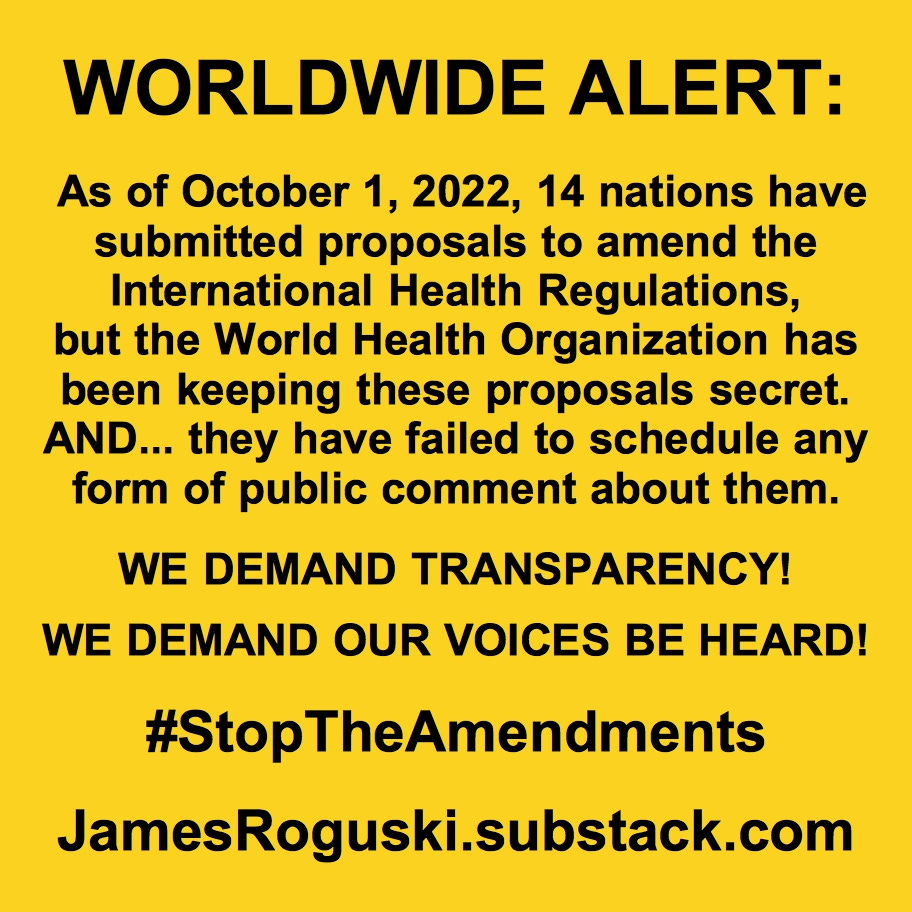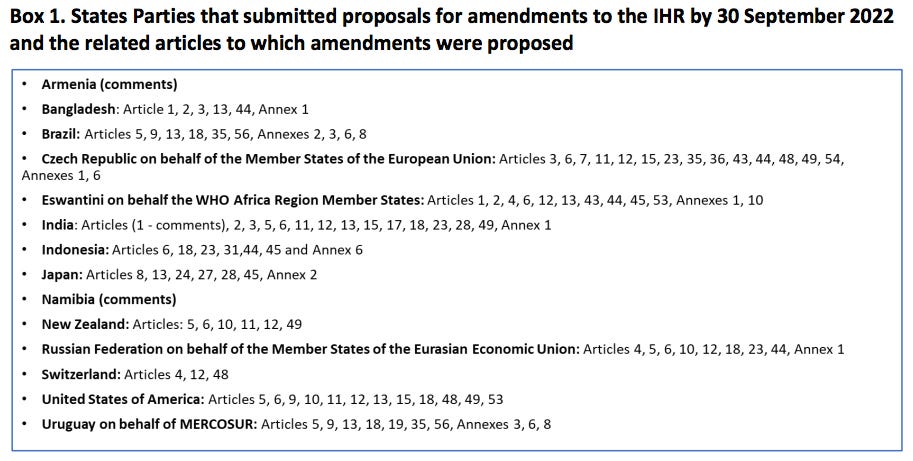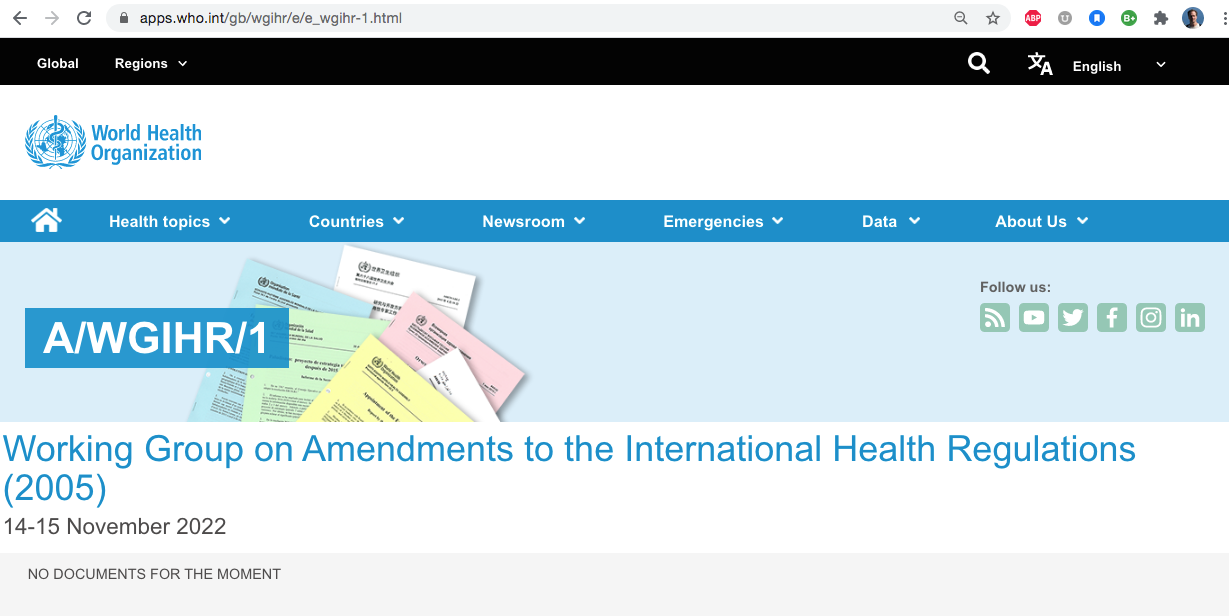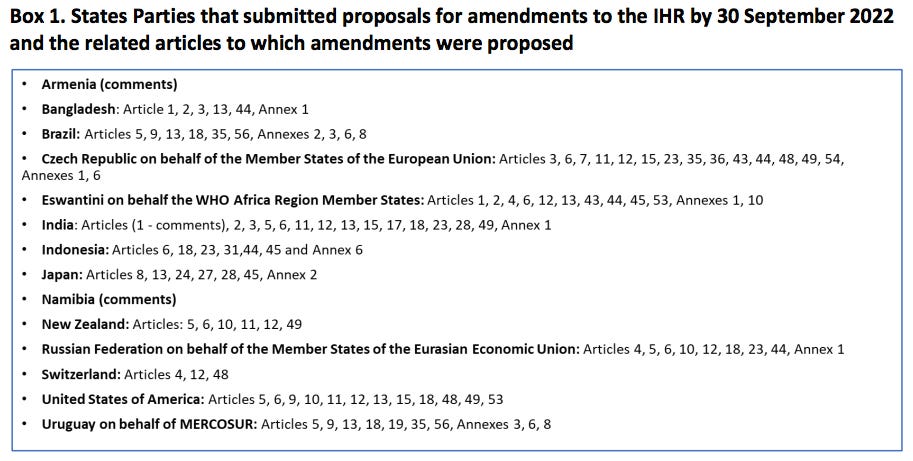Why the Secrecy?
The WHO is keeping information hidden from We the People of the World. So what else is new?
CLICK HERE for background on this story.
CLICK HERE to take action!
CLICK HERE for The People’s Amendments.
Please watch the videos below…
On page 6 of the “Basic Documents” of the World Health Organization, it says…
Informed opinion and active co-operation on the part of the public are of the utmost importance in the improvement of the health of the people.
On pages 98-99 of the “Basic Documents” of the World Health Organization, it says…
Principles
5. WHO’s engagement with non-State actors is guided by the following overarching principles. Any engagement must:
(h) be conducted on the basis of transparency, openness, inclusiveness, accountability, integrity and mutual respect.
The principles listed above are what the World Health Organization is supposed to do.
What the WHO actually does, well that’s a little bit different:
“NO DOCUMENTS FOR THE MOMENT”
(If you click on the image above and find that the WHO has finally gotten around to publishing the proposed amendments, please let me know directly (+1 310-619-3055) or post it in the comment section below this article.)
As of October 28, 2022, 4 weeks have passed and the World Health Organization is still keeping the proposed amendments submitted by 14 member nations a secret.
It seems that the 18 technocratic “experts” appointed by Tedros Adhanom Ghebreyesus to the International Health Regulations Review Committee are given access to documents, but We the People of the World are not allowed to see those documents.
The delegates from every one of the 194 member nations have access to these proposed amendments. They are also keeping them secret.
Freedom of information requests have been submitted from people in Australia, Finland, New Zealand, South Africa, the United Kingdom and the United States. Email requests have been sent to members of the International Health Regulations Review Committee (IHRRC) as well as to over a dozen members of the United States delegation to the WHO.
The World Health Organization finally published the report of the initial meeting of the International Health Regulations Review Committee (IHRRC) that was held on October 6, 2022.
An excerpt from the report is below:
WGIHR is the Member States “Working Group on Amendments to the International Health Regulations (2005)”, established also through Decision WHA75(9) as a continuation of the Working Group on Strengthening WHO Preparedness and Response to Health Emergencies, (WGPR) with a revised mandate to work exclusively on consideration of proposed targeted amendments to the International Health Regulations (2005), consistent with decision EB150(3) (2022), for consideration by the Seventy-seventh World Health Assembly in 2024;
Legal Counsel reviewed the mandate of the Committee as provided for by the Decision WHA75(9) and the relevant provisions of the IHR and reminded all members that they are acting solely in their capacity as individual experts and not on behalf of any government or organization. The requirement to keep all proceedings confidential was also recalled.
Legal Counsel reminded the Committee that they are constituted as an Expert Committee under the WHO Rules and procedures for Expert Advisory Panels, as provided for in the Basic Documents of WHO.
Committee members were invited to have a first read of the proposed amendments, and to consider a potential categorization of the proposals into the following categories:
“quick wins” (proposals that may not pose any controversy and are helpful for clarifications and better implementation of the articles);
“convergent proposals” (amendments proposed for the same article which are complementary or similar in scope);
“divergent proposals” (amendments for the same article which are different in scope, and/or controversial);
“new articles” (amendments that propose introduction of completely new text).
Another category might include the proposed amendments that address issues currently being considered within the scope of the new convention, agreement, or other international instrument on pandemic preparedness and response, currently being considered by the Intergovernmental Negotiating Body.
THE LATEST AVAILABLE INFORMATION:
NOTES:
The existing IHR can be downloaded HERE.
The original Biden Amendments proposal can be downloaded HERE.
The original Biden Amendments proposal addressed the exact same list of 12 Articles that are listed above, plus a 13th (Article 59) which is not included in this proposal because it was already amended on May 27, 2022. I do not yet know if the current proposal by the United States is exactly the same as the original.
IT BETTER NOT BE!!!
Armenia and Namibia submitted comments only, possibly because they are party to the submissions submitted by the Eurasian Economic Union and the WHO Africa Region Member States, respectively.
It is unclear whether Brazil’s proposal stands alone or if Brazil is also a party to the proposal submitted by MERCOSUR.
It certainly seems like a lot of changes have been proposed.
On page 4 of the “Terms of Reference” the possibility of “reopening the instrument” is clearly mentioned as a possibility.
It sure would be nice if the WHO would publish the proposals so We the People of the World could know what they are planning to do to us in the future.
SUMMARY
The list below shows that, collectively, the proposals seek to amend nearly half (32/66) of the Articles in the current International Health Regulations. The fact that multiple proposals seek to amend many articles is detailed below (X).
PART 1 - DEFINITIONS, PURPOSE AND SCOPE, PRINCIPLES AND RESPONSIBLE AUTHORITIES
Article 1: Definitions - Bangladesh, the Member States of the European Union and the WHO Africa Region Member States (3)
Article 2: Purpose and scope - Bangladesh, the WHO Africa Region Member States and India (3)
Article 3: Principles - Bangladesh, the Member States of the European Union and India (3)
Article 4: Responsible Authorities - The WHO Africa Region Member States, the Member States of the Eurasian Economic Union and Switzerland (3)
PART II - INFORMATION AND PUBLIC HEALTH RESPONSE
Article 5: Surveillance - Brazil, India. New Zealand, the Member States of the Eurasian Economic Union, the United States of America and MERCOSUR (6)
Article 6: Notification - The Member States of the European Union, the WHO Africa Region Member States, India, Indonesia, New Zealand, the Member States of the Eurasian Economic Union and the United States of America (7)
Article 7: Information sharing during unexpected or unusual public health events - The Member States of the European Union (1)
Article 8: Consultation - Japan (1)
Article 9: Other reports - Brazil and the United States of America and MERCOSUR (3)
Article 10: Verification - New Zealand, the Member States of the Eurasian Economic Union and the United States of America (3)
Article 11: Provision of information by WHO - The Member States of the European Union, India, New Zealand, and the United States of America (4)
Article 12: Determination of a Public Health Emergency of International Concern (PHEIC) - The Member States of the European Union, the WHO Africa Region Member States, India, New Zealand, the Member States of the Eurasian Economic Union, Switzerland and the United States of America (7)
Article 13: Public Health Response - Bangladesh, Brazil, the WHO Africa Region Member States, India, Japan, the United States of America and MERCOSUR. (7)
Article 14: Cooperation of WHO with intergovernmental organizations and international bodies (0)
PART III - RECOMMENDATIONS
Article 15: Temporary recommendations - The Member States of the European Union, India, and the United States of America (3)
Article 16: Standing recommendations - (0)
Article 17: Criteria for recommendations - India (1)
Article 18: Recommendations with respect to persons, baggage, cargo, containers, conveyances, goods and postal parcels - Brazil, India, Indonesia, the Member States of the Eurasian Economic Union, the United States of America and MERCOSUR (6)
PART IV - POINTS OF ENTRY
Article 19: General obligations - MERCOSUR (1)
Article 20: Airports and ports - (0)
Article 21: Ground crossings - (0)
Article 22: Role of competent authorities - (0)
PART V - PUBLIC HEALTH MEASURES
Chapter 1 - General provisions
Article 23: Health measures on arrival and departure - The Member States of the European Union, India, Indonesia and the Member States of the Eurasian Economic Union (4)
Chapter II - Special provisions for conveyances and conveyance operators
Article 24: Conveyance operators - Japan
Article 25: Ships and aircrafts in transit - (0)
Article 26: Civilian lorries, trains and coaches in transit - (0)
Article 27: Affected conveyances - Japan (1)
Article 28: Ships and aircraft at points of entry - India and Japan (2)
Article 29: Civilian lorries, trains and coaches at points of entry - (0)
Chapter III - Special provisions for travellers
Article 30: Travellers under public health observation (0)
Article 31: Health measures relating to entry of travellers - Indonesia (1)
Article 32: Treatment of travellers -(0)
Article 33: Goods in transit - (0)
Article 34: Container and container loading areas - (0)
PART VI - HEALTH DOCUMENTS
Article 35: General rule - Brazil, the Member States of the European Union and MERCOSUR (3)
Article 36: Certificates of vaccination or other prophylaxis - The Member States of the European Union (1)
Article 37: Maritime Declaration of Health - (0)
Article 38: Health Part of the Aircraft General Declaration - (0)
Article 39: Ship sanitation certificates - (0)
PART VII - CHARGES
Article 40: Charges for health measures regarding travellers - (0)
Article 41: Charges for baggage, cargo, containers, conveyances, goods or postal parcels - (0)
PART VIII - GENERAL PROVISIONS
Article 42: Implementation of health measures - (0)
Article 43: Additional health measures - The Member States of the European Union and the WHO Africa Region Member States (2)
Article 44: Collaboration and assistance - Bangladesh, the Member States of the European Union, the WHO Africa Region Member States, Indonesia, and the Member States of the Eurasian Economic Union (5)
Article 45: Treatment of personal data - The WHO Africa Region Member States, Indonesia and Japan (3)
Article 46: Transport and handling of biological substances, reagents and materials for diagnostic purposes - (0)
PART IX - THE IHR ROSTER OF EXPERTS, THE EMERGENCY COMMITTEE AND THE REVIEW COMMITTEE
Chapter 1 - The IHR Roster of Experts
Article 47: Composition - (0)
Chapter II - The Emergency Committee
Article 48: Terms of reference and composition - The Member States of the European Union, Switzerland and the United States of America (3)
Article 49: Procedure - The Member States of the European Union, India, New Zealand and the United States of America (4)
Chapter III - The Review Committee
Article 50: Terms of reference and composition - (0)
Article 51: Conduct of business - (0)
Article 52: - Reports - (0)
Article 53: Procedures for standing recommentations - The WHO Africa Region Member States, and the United States of America (2)
PART X - FINAL PROVISIONS
Article 54: Reporting and Review - The Member States of the European Union (1)
*Article 55: Amendments - (0)
Article 56: Settlement of disputes - Brazil and MERCOSUR (2)
Article 57: Relationship with other international agreements - (0)
Article 58: International sanitary agreements and regulations - (0)
*Article 59: Entry into force; period for rejection or reservations - (0)
Article 60: New member states of WHO - (0)
*Article 61: Rejection - (0)
*Article 62: Reservations - (0)
*Article 63: Withdrawal of rejection and reservation (0)
Article 64: States not members of WHO - (0)
Article 65: Notifications by the Director-General - (0)
Article 66: Authentic texts - (0)
*Articles (55, 59, 61, 62, 63) that were amended on May 27, 2022 (see sources below). There are questions regarding when the amendments will enter into force.
Annex 1: A. - CORE CAPACITY REQUIREMENTS FOR SURVEILLANCE AND RESPONSE - B. CORE CAPACITY REQUIREMENTS FOR DESIGNATED AIRPORTS, PORTS AND GROUND CROSSINGS - Bangladesh, the Member States of the European Union, the WHO Africa Region Member States, India and the Member States of the Eurasian Economic Union (5)
Annex 2: DECISION INSTRUMENT FOR THE ASSESSMENT AND NOTIFICATION OF EVENTS THAT MAY CONSTITUTE A PUBLIC HEALTH EMERGENCY OF INTERNATIONAL CONCERN - Brazil and Japan (2)
Annex 3: MODEL SHIP SANITATION CONTROL EXEMPTION CERTIFICATE/SHIP SANITATION CONTROL CERTIFICATE - Brazil and MERCOSUR (2)
Annex 4: TECHNICAL REQUIREMENTS PERTAINING TO CONVEYANCES AND CONVEYANCE OPERATORS - (0)
Annex 5: SPECIFIC MEASURES FOR VECTOR-BORNE DISEASES - (0)
Annex 6: VACCINATION, PROPHYLAXIS AND RELATED CERTIFICATES - MODEL INTERNATIONAL CERTIFICATE OF VACCINATION OR PROPHYLAXIS - Brasil, the Member States of the European Union, Indonesia and MERCOSUR (4)
Annex 7: REQUIREMENTS CONCERNING VACCINATION OR PROPHYLAXIS FOR SPECIFIC DISEASES - (0)
Annex 8: MODEL OF MARITIME DECLARATION OF HEALTH - Health questions - Brazil and MERCOSUR (2)
Annex 9: THIS DOCUMENT IS PART OF THE AIRCRAFT GENERAL DECLARATION, PROMULGATED BY THE INTERNATIONAL CIVIL AVIATION ORGANIZATION - HEALTH PART OF THE AIRCRAFT GENERAL DECLARATION - (0)
Annex 10: [NEW] The WHO Africa Region Member States
SOURCES:
The International Health Regulations:
https://www.who.int/publications/i/item/9789241580496
The Original Biden Amendments:
https://apps.who.int/gb/ebwha/pdf_files/WHA75/A75_18-en.pdf
*Amendments that were adopted on May 27, 2022
https://apps.who.int/gb/ebwha/pdf_files/WHA75/A75_ACONF7Rev1-en.pdf
Working Group for Amendments to the International Health Regulations (WGIHR)
https://apps.who.int/gb/wgihr/index.html
IHR Secretariat:
https://www.who.int/teams/ihr/about
The IHRRC documents:
Terms of Reference:
Report of the first meeting of the IHRRC
This is the 41st article in this series.
Multilingual information regarding the proposed amendments to the International Health Regulations.
TEN THINGS EVERYONE NEEDS TO KNOW ABOUT THE WHO'S PROPOSED "PANDEMIC TREATY"
Get the United States OUT of the United Nations and The World Health Organization A.S.A.P.
World Health Organization Virtual Press Conference on Global Health Issues
The People's Amendments to the International Health Regulations
Why the Secrecy?
by James Roguski
The old system is crumbling, and we must build its replacement quickly.
If you are fed up with the government, hospital, medical, pharmaceutical, media, industrial complex and would like to help build a holistic alternative to the WHO, then feel free to contact me directly anytime.
JamesRoguski.substack.com/about
JamesRoguski.substack.com/archive
310-619-3055
All content is free to all readers.
All support is deeply appreciated.












Who else spotted the irony of the quote by the vax shill so-called Dalai Lama
Another sad guru 🧟♀️
Second point. Next to the notion of invasive/non invasive we need the notion of "shared storing, or rather lack of privacy. may be this is dealt with later in the article. I'll get back to this later once article finished